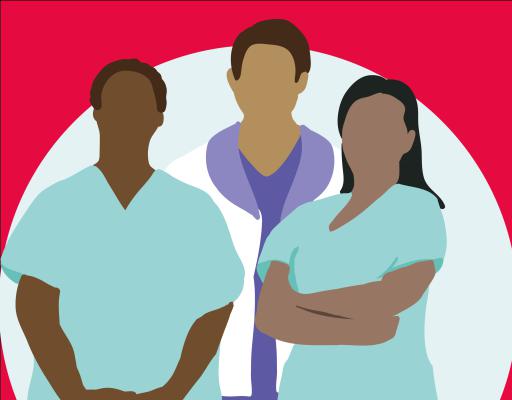How to choose where to be treated
It’s really important that following a diagnosis of a brain tumour you feel confident in where you are being treated, your medical team and the next steps for your care. In most cases, people will be really happy with where they have originally been referred to. However, sometimes this isn’t the case, and people may want to think about being treated elsewhere, or simply want to know more about their options.
There are different things to consider when thinking about where to be treated, and it’s helpful to remember that what is important and best for one person, could be completely different in the next. It’s a really personal decision, but can be difficult to know where to start.
To help you feel more informed, we’ve put together some suggestions about what to think about when choosing where to be treated.
Questions to ask
When making this kind of decision, you might want to think about the following questions:
-
Keep in mind that you might be going to lots of different appointments, and if your driving has been impacted, this could be more difficult to navigate. Do you want to be doing lots of long journeys? Can you stay somewhere local to the hospital? Sometimes, if you’re feeling a bit tired or impacted by your treatment, you might want to prioritise the closest centre
-
You might want to ask what professionals the centre has, who will be able to support you. For example, do they have any specialist support services within the hospital, will you have access to Clinical Nurse Specialists on your team or links to any neuro-rehabilitation services? You can ask your GP about this, or talk to your consultant.
-
Do they offer the treatment that you need to have? Making sure you are clear about this and how it would be accessed can help you to understand what’s to come.
-
Some centres will have more of a speciality in certain tumour types than others. This could be down to the research that their consultants and staff have been involved in, or the number of patients with specific tumour types they’ve treated. Remember that bigger isn’t necessarily better, but could be useful to understand and this could contribute to your decision. You can find information about this in the maps below.
-
It can be helpful to find out if they have any clinical trials running at their centre, or if they have previously done any research into different tumour types.
Tessa Jowell Centres of Excellence
Founded in 2018 to lead a new national strategy for brain tumours, the Tessa Jowell Brain Cancer Mission (TJBCM) has led the national assessment of neuroscience centres, to found Tessa Jowell Centres of Excellence.
The Tessa Jowell Centres of excellence programme has been developed to enable and encourage as many neuroscience centres as possible to achieve centre of excellence designation. This has been a rigorous process which involved peer review and patient feedback from our IBTC surveys and all of the centres who participated underwent an extensive assessment process which involved a range of criteria, including;
- excellent clinical practice
- emphasis on patient quality of life
- staff training opportunities
- the ability to offer research opportunities to patients
Neuro-Oncology Centres awarded Tessa Jowell Centre of Excellence in 2020-2022
- University Hospitals Birmingham
- Edinburgh Centre for Neuro-oncology
- King’s Health Partners (King’s College Hospital, Guy’s and St Thomas’s Hospitals and Kent Cancer Centre)
- Leeds Teaching Hospitals NHS Trust
- Salford Royal Foundation Trust & The Christie
- Newcastle upon Tyne Hospitals NHS Foundation Trust
- Nottingham University Hospitals
- St George’s University Hospital, Royal Marsden & Royal Surrey County Hospital
- University College Hospital London NHS Foundation Trust
- Liverpool Network (The Walton Centre, The Clatterbridge Cancer Centre and North Wales Cancer Treatment Centre)
- Barts Health
- The East of England service (Cambridge University Hospitals, Norfolk Norwich Hospital and Ipswich Hospital)
- Oxford University Hospitals and the Thames Valley Neuro-oncology Network
- The Bristol Network (North Bristol NHS Trust, University Hospitals Bristol NHS Trust, Gloucestershire Hospitals NHS Foundation Trust, Royal United Hospitals Bath NHS Trust)
- Imperial College Healthcare NHS Trust
- Cardiff Neuro-oncology centre (Velindre Cancer Centre and University Hospital Wales)
- Sheffield Teaching Hospital NHS Foundation Trust
Tessa Jowell Centre of Excellence for Children
In 2024 the Tessa Jowell Brain Cancer Mission awarded the first Tessa Jowell Centres of Excellence for Children. This initiative aims to recognise paediatric neuro-oncology centres that provide excellent treatment, care and research activities for children with brain tumours and their families.
The 6 centres that have been awarded this recognition are:
- Alder Hey Children’s NHS Foundation Trust
- Great Ormond Street Hospital NHS Foundation Trust (GOSH) and University College London Hospitals NHS Foundation Trust (UCLH) Joint Centre
- Greater Manchester Children’s Neuro-oncology Service: The Royal Manchester Children’s Hospital and The Christie NHS Foundation Trust
- Newcastle Hospitals and Newcastle University
- Nottingham Children’s Hospital at Nottingham University Hospitals NHS Trust
- Sheffield Children’s NHS Foundation Trust
What if I’m not being treated in a Centre of Excellence? Does this mean I should be concerned about my care?
No, not necessarily! This is the start of this new programme and not all centres applied to become a centre of excellence and those that weren’t successful this time often missed out by a small margin, the TJBCM and The Charity will be working with them to help them improve. Through the academy the TJBCM will be supporting the sharing of best practice and learning to improve standards of care nationally which we as a Charity will also be supporting.
How do I move my care/treatment to a centre of excellence?
All patients within the NHS have the right to request a second opinion, if this is something you’d like to do you can speak to your consultant or GP (normal second opinion advice) However the centres programme is not designed to encourage patients to move around the country but rather to reassure that excellence is shared between centres – all centres will be able to benefit from the academy as it develops.

NHS Information
The NHS has put together a database of information about hospitals, services and consultants to help people make decisions about where to be treated and who to be treated by. It can be helpful to have a look through this to find out about different aspects of hospitals, such as:
- Waiting times
- Patient Safety
- Patient feedback and reviews
- Complaints
- Quality of food
You can use the following tool to look for this information: https://www.nhs.uk/service-search/hospital
You might also want to have a look at the Care Quality Commission (CQC) information for each hospital. The CQC are the independent regulator of health and social care in England. Their aim is to make sure that services provide a high quality of care to the community, and provide a performance rating for each hospital. You can read about the latest inspection report of hospitals on their website here: https://www.cqc.org.uk/what-we-do/services-we-regulate/find-hospital
Support and Information Services
Research & Clinical Trials Information
You can also join our active online community.
In this section

Get support
If you need someone to talk to or advice on where to get help, our Support and Information team is available by phone, email or live-chat.
